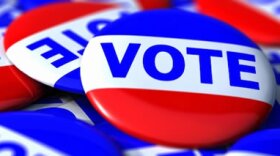Aside from choosing the next governor and other officeholders tomorrow, Massachusetts voters will face four ballot questions on Election Day. One of the questions involves expanding the state’s bottle deposit law to non-carbonated beverages.The issue of placing a five-cent deposit on bottled water and other non-carbonated beverages has been seen and heard on television and radio ads throughout this election cycle. The No on Question 2: Stop Forced Deposits coalition of businesses, individuals and recycling companies has enlisted the help of people like Dr. Jeffrey Zabel, an economics professor at Tufts University.
“Expanding forced deposits under Question 2 would cost up to 10 times more per ton than curbside recycling and it’s likely to increase the recycling rate by less than one percent,” Zabel said. “Stores and other businesses would face additional operating costs of more than $60 million a year; hence consumers are likely to pay higher grocery prices.”
Ads from the Stop Litter: Yes on 2 group feature people such as former Massachusetts Park Ranger Curt Rudge.
“It would dramatically decrease the amount of trash that we’re seeing in our parks today,” Rudge said. “What I know is that after working in the park system for 39 years is that the bottle bill works.”
All told, those opposing the initiative have spent $8.3 million, according to the Massachusetts Office of Campaign and Political Finance. Supporters have spent roughly $905,000. In 1982, Massachusetts voters approved a nickel deposit on cans and bottles of soda and beer. Over the last 15 years efforts by those wishing to expand the law to iced tea and sports drinks have fallen short, with bills failing to pass in both legislative houses. Jenny Gitlitz leads the Berkshire-area efforts for the Stop Litter campaign.
“It recovers 82 percent of the containers it targets, the soda and the beer, as opposed to 23 percent of non-carbonated beverage containers because those don’t have a deposit and they have a terrible recycling rate,” Gitlitz said. “So including them in the bottle bill makes sense.”
Nicole Giambusso is the spokesperson for the ‘No’ coalition, which has more than 3,500 supporters including grocery store chains, the powerful American Beverage Association and multiple chambers of commerce.
“If we’re going to look at how to bring recycling to all communities in Massachusetts, the idea is expanding programs that are comprehensive and convenient,” Giambusso said. “It wouldn’t make sense for these communities to try to increase recycling by having people separate just beverage containers, which make up less than one percent of the waste stream and drive them back to the grocery store. That just doesn’t make any sense.”
New York and Connecticut both recently expanded bottle deposit laws and Maine has required a deposit on bottled water for 10 years. Gitlitz believes the cost figure is a scare tactic, saying significant price increases were not seen in the neighboring states. Giambusso says forced deposit is an outdated system created when single-stream and curbside recycling didn’t exist. She says the two ideas cannot coexist.
“Consumers will also pay when it comes to unclaimed deposits,” Giambusso said. “That five-cent per container deposit, if the container is recycled at home, that money goes to the state. Over the past 10 years $350 million in unclaimed deposits have gone to the state’s general fund and not to environmental programs. There’s nothing in this proposal to insure that that environment fund will not be raided again.”
Gitlitz says the deposit will capture items often thrown away.
“Thirty to 50 percent of everything we drink we’re drinking away from home, in our cars and at the office,” Gitlitz said. “Nobody is bringing those home to recycle. Here in Berkshires, most towns don’t ever have curbside. It’s not relevant.”
Yes supporters total more 130 environmental organizations, committees and individuals like Governor Deval Patrick, U.S. Senators Ed Markey and Elizabeth Warren and the entire Berkshire legislative delegation. About 158,000 signatures helped place the question on the ballot. A poll of likely voters conducted by SocialSphere Inc. for The Boston Globe and released October 30th found 66 percent planned to vote “No.” Just 28 percent said yes.
As for the other ballot questions, number 1 asks voters if they support eliminating a new law linking future increases in the gas tax to the rate of inflation. A "yes" vote eliminates the adjustment. A "no" vote allows the increases.
Question 3 asks voters if they support repealing the state's casino law, and Question 4 asks if workers should be entitled to accrue up to 40 hours of paid sick time per year.







